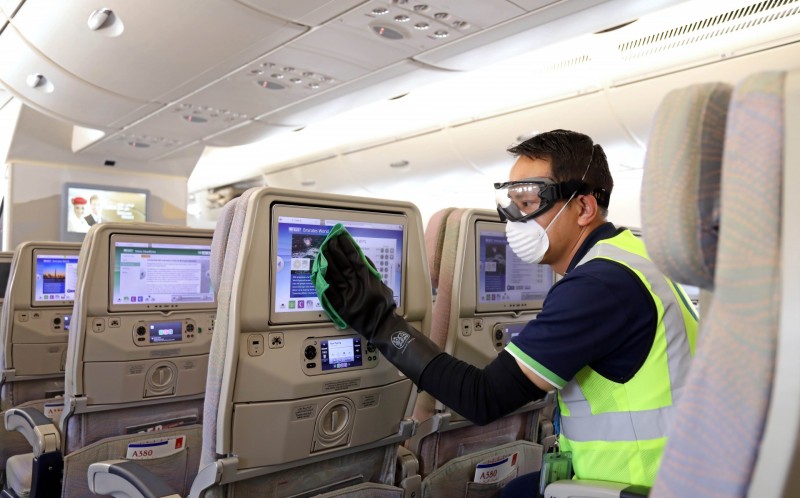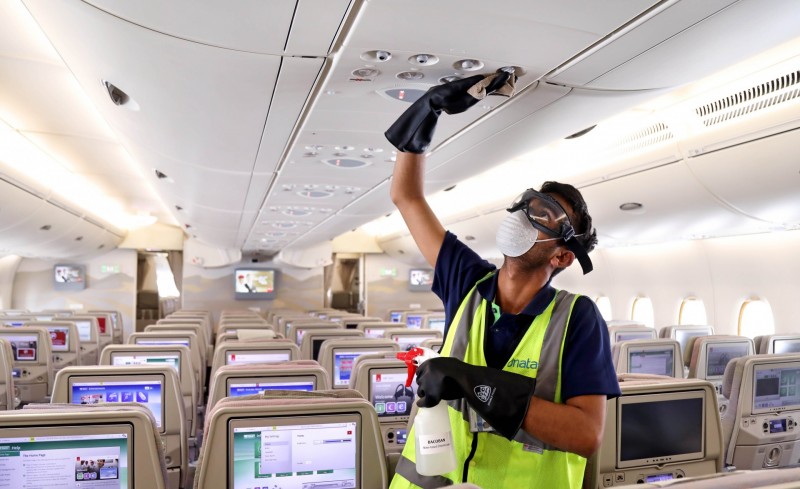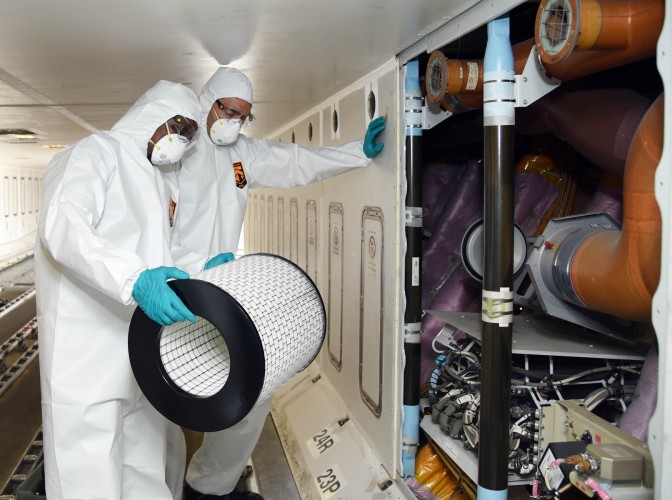CoronaVirus has been a spanner in the works for airlines globally, as nations try to protect their countries from the outbreak of the pandemic. In the wake of the virus, many global airlines have instituted procedures to deep cleanse their aircraft to ensure the CoronaVirus does not spread via their plane. Here is an update on Coronavirus and airlines cleansing their aircraft.
The International Air Transport Association (IATA) published a list of guidelines airlines should follow to protect passengers and crew from contracting the illness. IATA’s guidelines, which are not mandatory for airlines to follow, cover a range of measures such as screening passengers for fevers, equipping cabin crew with surgical or medical protective masks, and routinely disinfecting aircraft.
Emirates
On all aircraft departing from its hub in Dubai, Emirates has implemented enhanced cleaning and complete disinfection of all cabins as a precaution. In line with the latest expert medical finding that the COVID-19 virus is primarily transmitted by touch, Emirates has placed considerable focus on surface cleaning.

The airline uses an approved chemical that is proven to kill viruses and germs, leaves a long-lasting protective coating against new contamination of viruses, bacteria and fungi on surfaces, and is eco-friendly.

The cleaning process includes a thorough wipe down of all surfaces – from windows, tray tables, seatback screens, armrests, seats, in-seat controls, panels, air vents and overhead lockers in the cabin, to lavatories, galleys and crew rest areas. All of this is done in addition to other routine procedures such as changing headrest covers on all seats, replacement of reading materials, vacuuming, and more.
To complete this thorough cleaning process within an hour while the aircraft is preparing for its next mission requires a team of 18 trained cleaners on a Boeing 777, and a team of 36 for an A380. In 24 hours, some 248 aircraft go through this process.
On any aircraft that were found to have transported a suspected or confirmed COVID-19 case, Emirates would go even further and implement deep cleaning and disinfection in a process that takes between six to eight hours to complete. This includes the defogging of cabin interiors and misting with disinfectant across all soft furnishings, and replacement of seat covers and cushions in the affected area. The aircraft’s HEPA cabin air filters will also be replaced.

All of Emirates’ aircraft are fitted with HEPA cabin air filters which are proven to filter out 99.97% of viruses. They also remove dust, allergens and microbes from the air recirculated into the cabin and cockpit, which helps to provide a safer, healthier and more comfortable environment for the passengers and crew.
Qatar Airways
While Qatar Airways has not released any Q&A on its cleansing processes, they have released the above video. Apart from the cleansing of the aircraft, Qatar Airways’ linen and blankets are washed and dried at 90 degrees centigrade, then pressed using an iron operating at 100 degrees centigrade.
Cathay Pacific
Cathay Pacific is cleansing and disinfecting its aircraft cabins thoroughly, including a thorough wipedown of the IFE screens, meal tables, baby bassinet tables, and armrests across the aircraft after every flight.
Cathay Pacific has cancelled its elaborate meal services on any flights still operating to China and is serving a single tray for premium cabins. Premium Economy and Economy class passengers are getting a disposable snack bag. They have also done away with the hot towels, blankets, magazines and other surfaces which can be touched. Besides, Cathay Pacific has closed many of their lounges at Hong Kong Airport till further notice.
Singapore Airlines
Singapore Airlines is using a strong disinfectant to clean surfaces such as tray tables, windows and IFE screens on all aircraft flying to Hong Kong and mainland China. Aircraft arriving from China are also undergoing fogging, which takes 90 minutes for an A380 aircraft and 60 minutes for other aircraft types. Subsequently, the aircraft is cleaned with disinfectant wipes.
Apart from this, there are changes to the meal services, with pre-packaged meals taking over the trolley service, including the Satay service, desserts and cheese. Further, meals will be a tray service on some routes. On the same lines as Cathay Pacific, hot towels have been moved to wet towelettes, and dutyfree sale catalogues and magazines have been removed from the aircraft.
Delta
Delta consulted with the CDC, WHO and other health organizations. Delta is using an EPA-registered disinfectant on all flights, which is rated to combat many infectious diseases. Fogging procedures are being performed on all trans-Pacific flights arriving into the U.S. Delta has sourced additional machines to expand fogging to inbound international flights, prioritizing trans-Atlantic inbound flights from markets with reported coronavirus cases. Here is a message that the Delta head of Customer Experience who commented on how Delta is taking precautions.
Indian Carriers
Unfortunately, apart from cancelling flights to affected areas, Indian carriers are not doing much towards making sure the virus is not being transmitted via their aircraft. Domestic flights and international flights are still being operated with a mix of aircraft, and no special measures have been reported yet from airlines about how they are deep cleaning aircraft in between flights.
Unfortunately, with 25-minute turnarounds between flights, this also looks improbable for Indian Carriers to do anything beyond re-arrange the seatbelts on their plane and making sure missing items are replaced. Not just that, from my own experience over the last week flying around four Indian airports, no domestic airline was seen maintaining any sort of precaution to ensure their employees and cleaner crew were safe, apart from putting on a mask, and not a full personal protection suit.
Unfortunately, if things blow up, we will find our airlines’ response lacking, where there is hardly any preparation for the disinfection of the aircraft and make sure customers are protected and feel confident travelling on domestic carriers.
What do you make of the readiness of the airlines for travel during the CoronaVirus outbreak?
Liked our articles and our efforts? Please pay an amount you are comfortable with; an amount you believe is the fair price for the content you have consumed. Please enter an amount in the box below and click on the button to pay; you can use Netbanking, Debit/Credit Cards, UPI, QR codes, or any Wallet to pay.
(Important: to receive confirmation and details of your transaction, please enter a valid email address in the pop-up form that will appear after you click the ‘Pay Now’ button. Even though the amount you enter has to be in INR, you may use an international card to process the transaction.)
We are not putting our articles behind any paywall where you are asked to pay before you read an article. We are asking you to pay after you have read the article if you are satisfied with the quality and our efforts.


4 pax of my family were booked to travel by GoAir PNQ to DEL on 21st March and return on 24th by Indigo. COVID-19 has forced forced cancellation of the function in Delhi. Tried cancelling both flights and realised that the lofty press releases by both airlines are bogus. Go Air will cancel only tickets booked (NOT travel dates) after 08 March and beyond but 14 days before travel. Full cancellation fees otherwise. How very generous of them. Indigo will charge exorbitant cancellation fees equalling the price of the tickets themselves. Pure hokum these announcements. Absolutely useless to actual travellers.
This article should be sent to Ministry of Civil Aviation, Govt of India.
I was waiting for this article from you. So glad you published. Goes a long way to show how callous and non-chalant we are about safety of our people. Makes me sad.